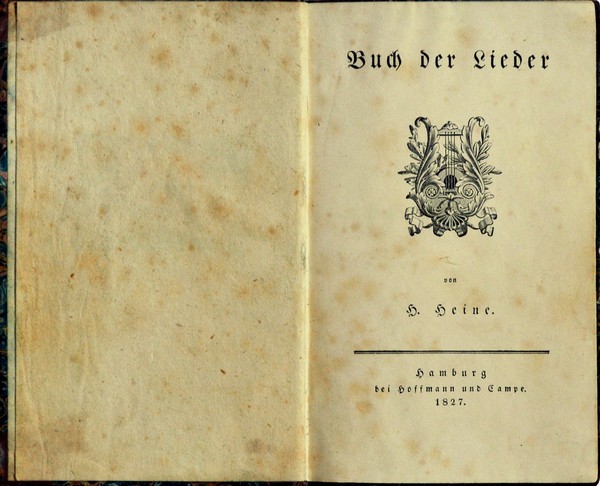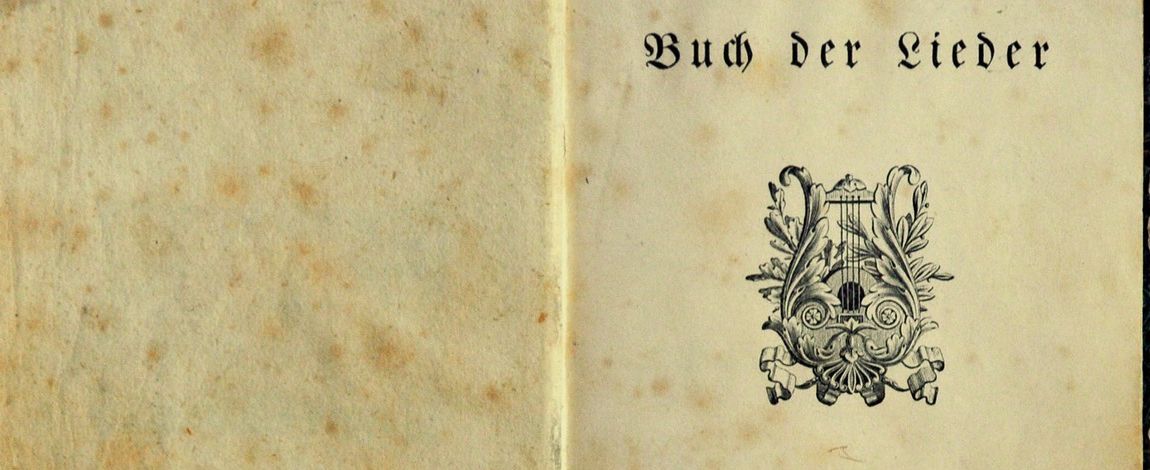
A while ago I wrote an article giving details of the poems from Lyrisches Intermezzo that Schumann chose to compose his Dichterliebe. While I was preparing, I marked in my copy of the Buch der Lieder those poems, and others, that I also identified as musicalized. Earlier, I had marked the six poems of Schubert's Schwanengesang and some other, and a few days ago, when I was preparing the first part of this article, I marked some more. At this point, my book is adorned with many small pieces of coloured paper.
It was precisely while working on this article that I retook an idea that came to my mind when I started to mark poems: a series of songs from the Buch der Lieder. At the beginning, it was a vague idea that came back with different options every time I heard a song with a Heine's poem, until it took the form I'm presenting this week. Beyond Schubert and Schumann, who usually focus our attention, many composers felt attracted to the Buch der Lieder, so why not make a list of ten songs by ten different composers that didn't include Schubert, Schumann and the poems they set into music? This way, I set aside (at least for now) the idea of making a series with less-known versions of the best-known poems..
Thus, a new list begins today on Liederabend, "The Buch der Lieder and ten composers". I'm listing below the ten songs, being aware that I could have included many others, but I think it's a sufficiently representative list, with more or less known works by more or less known composers; I added in parentheses the title of the song when it doesn't match the first verse of the poem. The songs are sorted according to Heine's collection, we'll see in which order I'll publish them.
We begin with Hugo Wolf, with a song from a cycle that is virtually his first one: Liederstrauß: Sieben Gedichte aus dem Buch der Lieder von Heinrich Heine [A bunch of songs, Seven poems from Heinrich Heine's Buch der Lieder]. As you can see, his habit of highlighting the importance of the poet by using the word Gedichte in the title of his works (even, in this case, contradicting Heine) was not a matter of his mature years. The seven Lieder, three with poems from Die Heimkehr (among them, the one that Schubert named Ihr Bild) and four from Lyrisches Intermezzo, were composed during the spring of 1878, when Wolf had just turned eighteen, and ten years before that 1888, when he began his long period of frenetic song composition.
Aus meinen großen Schmerzen (From my great sorrows) is the fourth song of the cycle, and corresponds to poem no. 36 from Lyrisches Intermezzo, a poem with only two stanzas, which talks about how the poet's sorrows become small songs that fly to the beloved and came back after their failed mission. In Wolf's lied, the vocal line, a quiet melody, contrasts with the piano accompaniment, in which we hear the poems flying back and forth, lively and tireless despite the successive disappointments. It's a lovely song, which anticipates the Wolf of years later, and we'll listen to the interpretation of Daniel Norman and Sholto Kynoch.
Despite the composer's insistence, he tried some publishers, the cycle wasn't published at that time, nor in his lifetime. It wasn't until 1903, a few months after Wolf's death, that some of the poems (Aus meinen großen Schmerzen among them) were published, in a collection of twelve songs from different poets entitled Lieder aus der Jugendzeit, Songs of youth.
Aus meinen großen Schmerzen
Mach' ich die kleinen Lieder;
Die heben ihr klingend Gefieder
Und flattern nach ihrem Herzen.
Sie fanden den Weg zur Trauten,
Doch kommen sie wieder und klagen,
Und klagen, und wollen nicht sagen,
Was sie im Herzen schauten.
From my great sorrows
I make small songs;
they lift their ringing feathers
and flutter to her heart.
They have found a way to my sweetheart,
yet they come back and lament,
and lament - but they will not say
what they have seen in her heart.
(translation by Emily Ezust)













